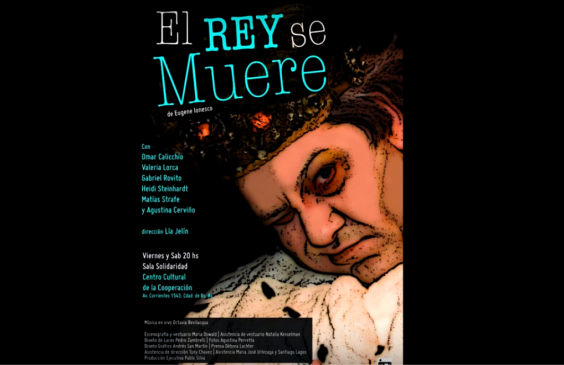Cremata and the Castroist Crematorium
by Orlando Luis Pardo Lazo translated by Alex Higson / November 11, 2015 / 1 Comment

Poster from the play “El Rey Se Muere.” Image via Youtube user: Silva Produccion.
Once-lauded Cuban playwright and filmmaker Juan Carlos Cremata faces censorship from Cuban authorities.
In mid-2015 in Havana, the National Council for the Dramatic Arts carried out the latest in a long line of acts of censorship of Cuban theater. On this occasion, they censored an artist who up until that point had been blessed with official applause and funding: movie and theater director Juan Carlos Cremata.

- Is it worth-while to focus on the last images and letters coming from the inside of the last living utopia on Earth? Is Cuba by now a contemporary country or just another old-fashioned delusion in the middle of Nowhere-America? A Cold-War Northtalgia maybe? Can we expect a young Rewwwolution.cu within that Ancien Régime still known as The Revolution? I would like to provoke more questions than answers.

- Orlando Luis Pardo Lazo was born in Havana City and still resides and resists there, working as a free-lance writer, photographer and blogger. He is the author of Boring Home (2009) and is the editor of the independent opinion and literary e-zine Voces.
After just a couple of performances, his adaptation of El rey se muere (Exit the King), a play by Eugène Ionesco, was pulled from the billing with no explanation. The cast found themselves thrown out of the Tito Junco Theater in the Bertolt Brecht Cultural Center, situated in the Havana neighborhood of El Vedado.
From the cynicism that characterizes communists from Moscow to New York, all that remains in Castroist Cuba is a cryptic “re-programming” note, reporting, as if it were a military communiqué, that “in order to achieve more purposeful stages between the poetic obsessions of our artists and the nation’s cultural police, the National Council for the Dramatic Arts and the Havana Theater Center have decided to cancel the production of El rey se muere, performed by the El Ingenio theater group.”
Of course, in a country where Fidel Castro is a moribund nonagenarian, wallowing in indistinguishable delirium and excretion, the state lives in fear of artistic metaphors about wicked characters who are petrified in power and whose despotism corrupts everything.
At the beginning of 2015, Cremata’s production of Cloaca (Cesspit) had already given rise to some political rather than artistic criticisms since it was a tragicomic, anti-establishment work. However, by luck or by materialist miracle, Cloaca — an interpretation of the María Goos play — did make it past the censors and the show went on until the end of its run.
The Cuban Ministry of Culture’s fear and mediocrity are nothing new, and they are always trying to cremate the irreverence of Cremata and other iconoclastic artists. In 2012, for example, his production of La hijastra (The Stepdaughter) — an original play by Rogelio Orizondo — was canceled despite constant sell-out shows. On that occasion, the director spoke out against these abuses via an email that went viral: “Censorship evolves too, and it adopts new methods, tactics, and means of preventing people from doing things. […] Somebody was saying recently that ‘double standards’ do not exist. Of course, what we have is precisely an absence of any kind of standards.”
This time, Cremata reacted in writing with even greater indignation: “In the name of this ‘national socialism’ we are restricted, repressed, sanctioned, gagged, knocked down, and hidden away. It is all-powerful fascism. It is pure, total and absolute — in the same way that national socialism burnt books and stigmatized races, sexes, colors and even thoughts or ways of being. And it is apartheid too. In Fassbinder’s words, ‘fear eats the soul.'”
In interviews in the foreign media, Cremata pulled no punches, describing the Ministry of Culture’s decision “as an erratic, medieval, fascist step, and very foolish at this time. It is yet another paragraph in a never-ending chapter of injustices and outrage, which have been felt the hardest by our country’s culture and artists.” Furthermore, “It is a declaration of abuse of power, absurdity and ignominy. But, definitively, it is more proof of the nature of those beings who gag, silence, prohibit and slow down the evolution of thought, and with it the lives of the majority of the Cuban people. It is an abuse of freedom of speech, artistic creativity and the most fundamental human rights.”
Anyone who speaks up in Cuba is a dead man walking. As such, Cremata’s statement — which he titled, “Condemn us. It does not matter. Art will absorb us.” — obliged authorities to treat him as an outcast for the rest of his days. The fact that he appropriated one of Fidel Castro’s own sacred quotes was his worst offense. In 1953, on trial for launching a military attack on a barracks in which many innocent soldiers died, Castro proclaimed: “Condemn me. It does not matter. History will absolve me.”
As a result, government officials now accuse the artist of causing “an ethical-professional conflict with the management of the Theater Center and the National Council for the Dramatic Arts, who legally represent and sponsor him.” The bureaucratic elite accuse the artist of “disproportionate attacks on these organizations in the foreign media and on social networks.” Consequently, they have declared that “they can no longer trust the artist, and as a result his proposals are barred from becoming institutional endeavors.”
Hear this: Juan Carlos Cremata can never again direct a single play or movie in Castro’s culturally castrated Cuba. So Cremata’s only hope now is purely biological, just as it is for a whole people of non-persons both on the island and in exile.
Hear this: only Fidel’s funeral will be the fiesta that sees the curtain finally fall on our absurdist totalitarian theater.
Enrique Colina, a well-know Cuban filmmaker has made public a letter protesting the censorship against Cremata. He writes: “After so many years of preaching Marxism-Leninism, now it seems that the guardians of the orthodoxy of silence have forgotten the laws of dialectics. They are floating on a submissive stagnation where faith and obedience to immobility seem to be the shrines at which they worship, to which they convoke us with their blaming anathemas and excommunications. No, pal, let´s protest.”





One Comment on "Cremata and the Castroist Crematorium"
True, that what the powers that be have done to Cremata is an abomination. True, that it has been standard practice since the beginning of the so called revolution-Virgilio Pinera comes to mind True, as you well said, Cremata has enjoyed and benefited from the official funding, backing and approval for thirty years til now. So I beg the question: how come he protested now and never before when he witnessed so many colleagues and friends censored and shunned? I’ll answer my own question. Because, “no le habian pisado el callo.” Attempt to translate: Because, “they hadn’t stepped on him personally.”
I have a problem with people who only react when they are personally affected by some arbitrary injustice. There’s a lack o solidarity and callousness towards the “other”. I find this is true for most people. I have no respect for Cremata.